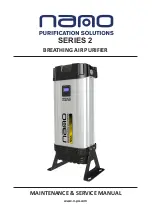
15 Troubleshooting
Installer reference guide
86
EJHA EHY32AA
Daikin Altherma Hybrid hydrosplit heat pump
4P531180-1 – 2018.06
8
Fill the condensate trap with water and fit it to the connection
below the condensate drain pan.
9
Slide the flue pipe, turning it counterclockwise, with the top
around the flue adapter into the top cover.
10
Insert the bottom into the condensate drain pan and tighten the
coupling nut clockwise.
11
Open the gas tap and check the gas connections below the gas
valve and on the mounting bracket for leakage.
12
Check the space heating and the water pipes for leakages.
13
Turn on the main power supply.
14
Turn on the appliance by pushing the button.
15
Check the front cover, the fan connection on the front cover and
the flue pipe components for leakage.
16
Check the gas/air adjustment.
17
Fit the casing, tighten the 2 screws on the left and right side of
the display.
18
Close the display cover.
19
Check the heating and hot water supply.
15
Troubleshooting
15.1
Overview: Troubleshooting
This chapter describes what you have to do in case of problems.
It contains information about:
▪ Solving problems based on symptoms
▪ Solving problems based on error codes
Before troubleshooting
Carry out a thorough visual inspection of the unit and look for
obvious defects such as loose connections or defective wiring.
15.2
Precautions when troubleshooting
WARNING
▪ When carrying out an inspection on the switch box of
the unit, ALWAYS make sure that the unit is
disconnected from the mains. Turn off the respective
circuit breaker.
▪ When a safety device was activated, stop the unit and
find out why the safety device was activated before
resetting it. NEVER shunt safety devices or change
their values to a value other than the factory default
setting. If you are unable to find the cause of the
problem, call your dealer.
DANGER: RISK OF ELECTROCUTION
WARNING
Prevent hazards due to inadvertent resetting of the thermal
cut-out: power to this appliance MUST NOT be supplied
through an external switching device, such as a timer, or
connected to a circuit that is regularly turned ON and OFF
by the utility.
DANGER: RISK OF BURNING
15.3
General guidelines
Before starting the troubleshooting procedure, carry out a thorough
visual inspection of the unit and look for obvious defects such as
loose connections or defective wiring.
15.4
Solving problems based on
symptoms
15.4.1
Symptom: The unit is NOT heating as
expected
Possible causes
Corrective action
The temperature setting is NOT
correct
Check the temperature setting on
the remote controller. See the
operation manual.
















































